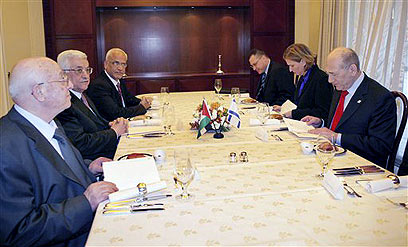
Secret docs: PA ceded much of Jerusalem
Al-Jazeera network publishes 1,600 confidential papers detailing concessions made during past 20 years of peace negotiations, including deal offered by Olmert to accept 1,000 Palestinian refugees a year for 'humanitarian' reasons
Secret documents published by Al-Jazeera reveal that the Palestinian negotiations team to talks with Israel agreed to cede almost all Jewish neighborhoods in east Jerusalem during secret talks between the sides.
The latest publication of thousands of classified Palestinian documents is considered the largest leak to date of protocols from the past 20 years of negotiations between Israel and the Palestinians.
The documents reveal large gaps between the official Palestinian position and the personal stance of the negotiating team members.
According to the leaked documents, the Palestinians agreed that Israel annex all Jewish neighborhoods in Jerusalem, except for Har Homa.
The documents, also published by UK-based newspaper the Guardian under the title "Slow death of Middle East Peace Process," indicate that the Palestinian leadership offered land transfers around Jerusalem.
According to the leaked papers, which will be published in full in the upcoming days, reveal that the Israeli leadership covertly approached Israeli-Arab citizens and asked if they would be willing to move to a new Palestinian state, when such a state is established.
The documents also shed light on some of the secret concessions that were agreed upon, including the Palestinian refugees' right of return to Israel.
On this matter, the documents reveal that former Prime Minister Ehud Olmert offered that Israel accept 1,000 Palestinian refugees into its territory per year for "humanitarian" reasons.
The offer, which was made in August of 2008, says Israel will recognize the Palestinian people's suffering but will not accept responsibility for it or compensate them in any way.
Olmert also suggested that Israel annex 6.8% of the West Bank, including the four large settlement blocs in Gush Etzion, in addition to the Jewish neighborhoods in east Jerusalem. In exchange, the Palestinians would receive 5.5% of Israel's land.
The former prime minister also suggested that passage between Gaza and the West Bank be under Israel's rule and under Palestinian authority, in this way remaining Israeli land.
Tight cooperation
Other documents exposed the intimate and tight cooperation between the Israeli and Palestinian security forces, suggesting that PA officials received prior information before Israel launched Operation Cast Lead in the Gaza Strip at the end of 2008.
A document detailing a meeting that took place on June 15, 2008, reveals that head of Palestinian negotiations team Ahmed Ali Mohammed Qureia suggested that Israel annex all the east Jerusalem neighborhoods except for Har Homa. However, Israel was unwilling to make any concessions in return. "This is the first time in history that we make such a proposition; we refused to do so in Camp David," Qureia reportedly said

Around the negotiations table. December 2007 (Photo: AP)
According to the records, the Palestinians expressed willingness to cede territory in the West Bank and east Jerusalem – including developed settlement blocs – in return for undeveloped land at the north of the Jordan Valley, south Mount Hebron and east of the Gaza Strip.In one meeting Erekat said "we are offering you the biggest Yerushalayim in history."
The Palestinian agreed to let Israel keep Jerusalem's Jewish Quarter as well as East Talpiot, Gilo, the French Hill and and Pigat Ze'ev at the north of the capital.
According to a January 2010 document, Saeb Erekat told US special envoy to the Middle East George Mitchell that the Palestinians have agreed to give Israel "greater Jerusalem" – the largest Jerusalem in the history of the Jewish people.
"The remainder of the Old City will be under Palestinian rule," Erekat told the US envoy. "We can discuss Temple Mount – there are creative ways to deal with the matter, for example a committee or authority to make decisions there."
In addition, Erekat claimed the Palestinians agreed to a demilitarized Palestinian state. "What more can we give?" Erekat was quoted as saying.
Qureia: Give us Maale Adumim
The documents also record a 2008 offer by Ahmed Qureia to former Foreign Minister Tzipi Livni, according to which the settlement of Maale Adumim would move to Palestinian rule.
Livni was said to answer that the offer was "unrealistic" as the Palestinians would "kill (the settlers) the very next day".
"So withdraw them, like you did in Gaza," Qureia was said to respond. "We will remove many settlers," Livni reportedly said.
Saeb Erekat, who was also present, provided support. "I agree with Tzipi. We don’t want Palestinians to become Israelis or Israelis to become Palestinians," he said. But Qureia said he did not care if the settlers became Palestinian citizens. "Let them stay," he said.
Olmert, Palestinians deny reports
Olmert's office responded to the publications by saying that there were "many inaccuracies" in them. Other Israeli officials who were involved in the negotiations also rejected much of Al-Jazeera's report.
Palestinian negotiators quickly denied the reports, saying parts of the documents were fabricated. Palestinian President Mahmoud Abbas said he has kept Arab countries fully briefed on the negotiations with Israel.
Qureia, told The Associated Press that "many parts of the documents were fabricated, as part of the incitement against the Palestinian Authority and the Palestinian leadership."
He denied making an offer about the Jewish enclaves in east Jerusalem, claiming that Israel refused to discuss the issue.
The current chief negotiator, Saeb Erekat, dismissed the documents as "a bunch of lies" during an appearance on Al Jazeera shortly after the documents were released.
In a heated exchange on Al Jazeera, Erekat was confronted by critics including Abdel Bari Atwan, editor of the London-based al -Quds al-Arabi newspaper, who asked him who had authorised him or the Palestinian leadership "to give up Islamic holy sites".
US State Department Spokesman Phillip Crowley issued a Twitter message Sunday saying that the US government is "reviewing the alleged Palestinian documents released by Al Jazeera" and added "We cannot vouch for their veracity."
Crowley added that the US "remains focused on a two-state solution and will continue to work with the parties to narrow existing differences on core issues."
Reuters, AP, and Attila Somfalvi contributed to this report
- Follow Ynetnews on Facebook










